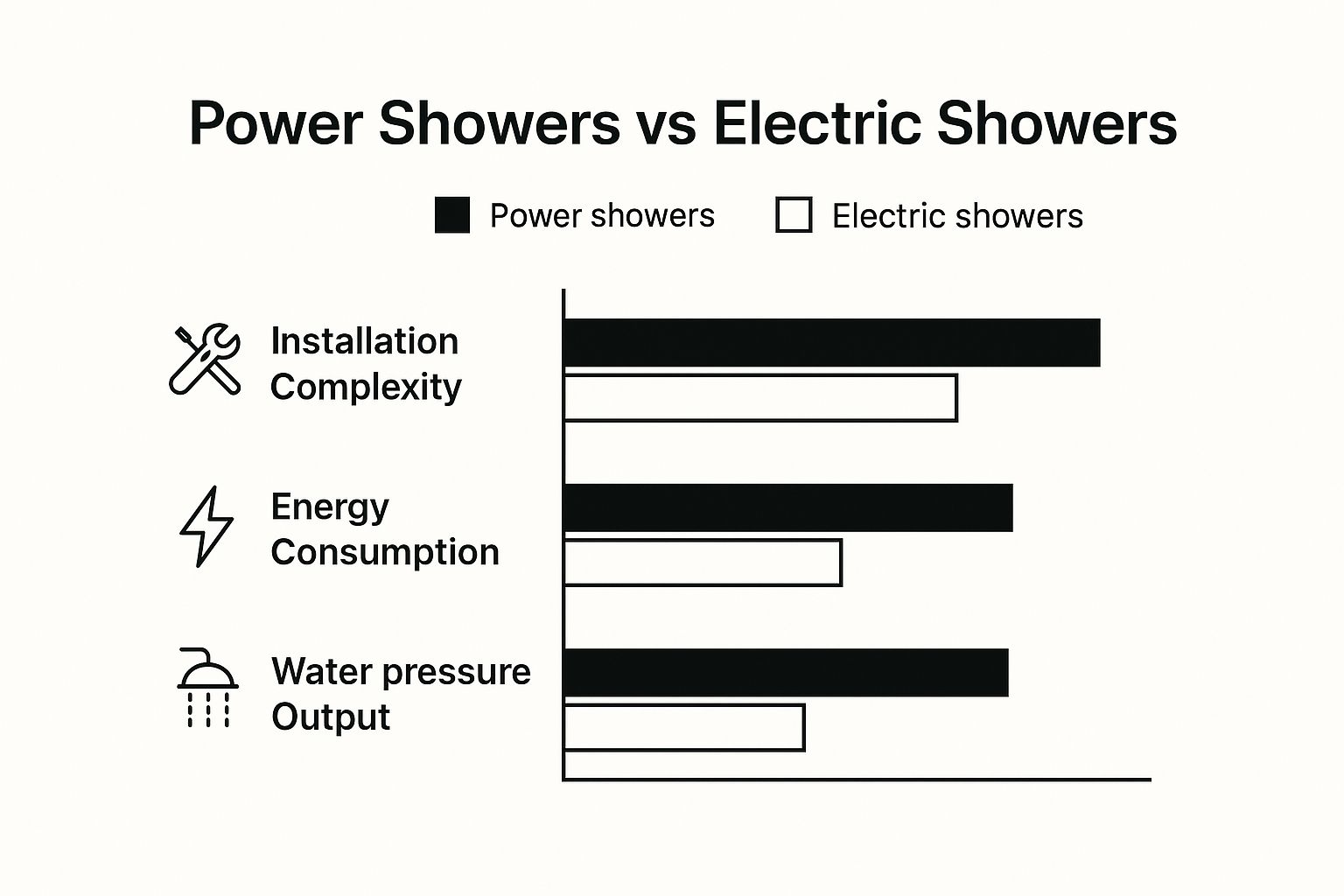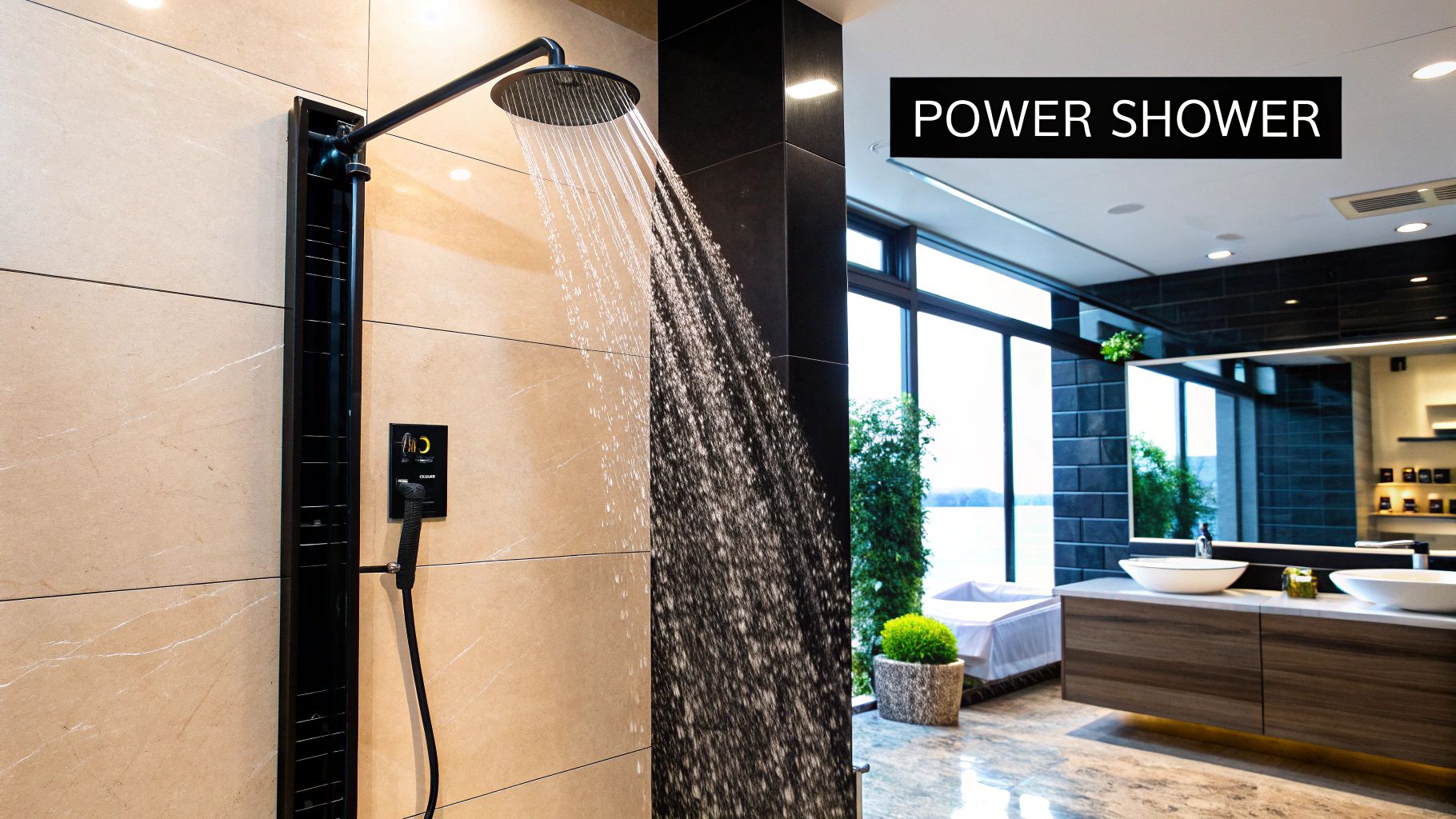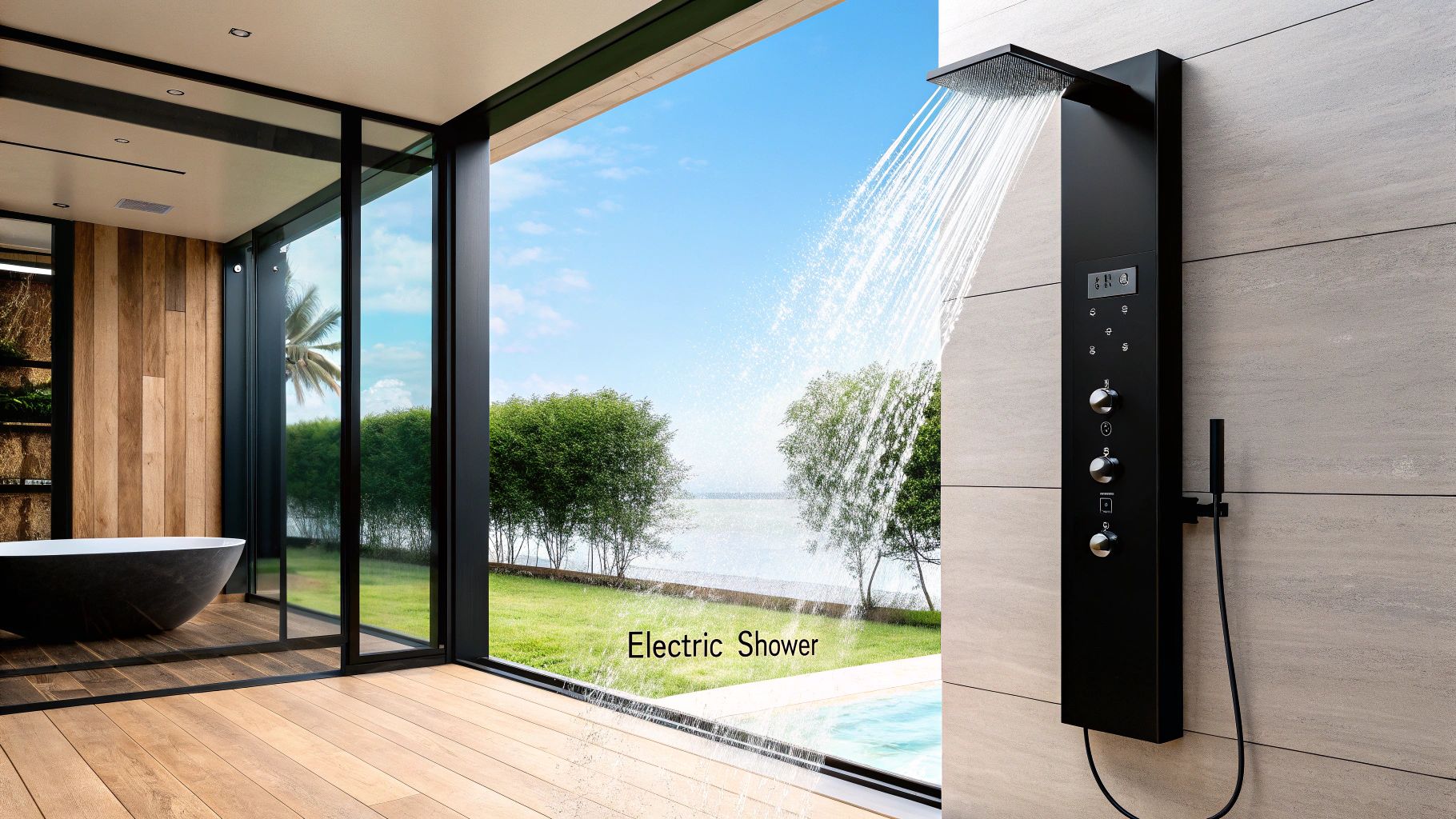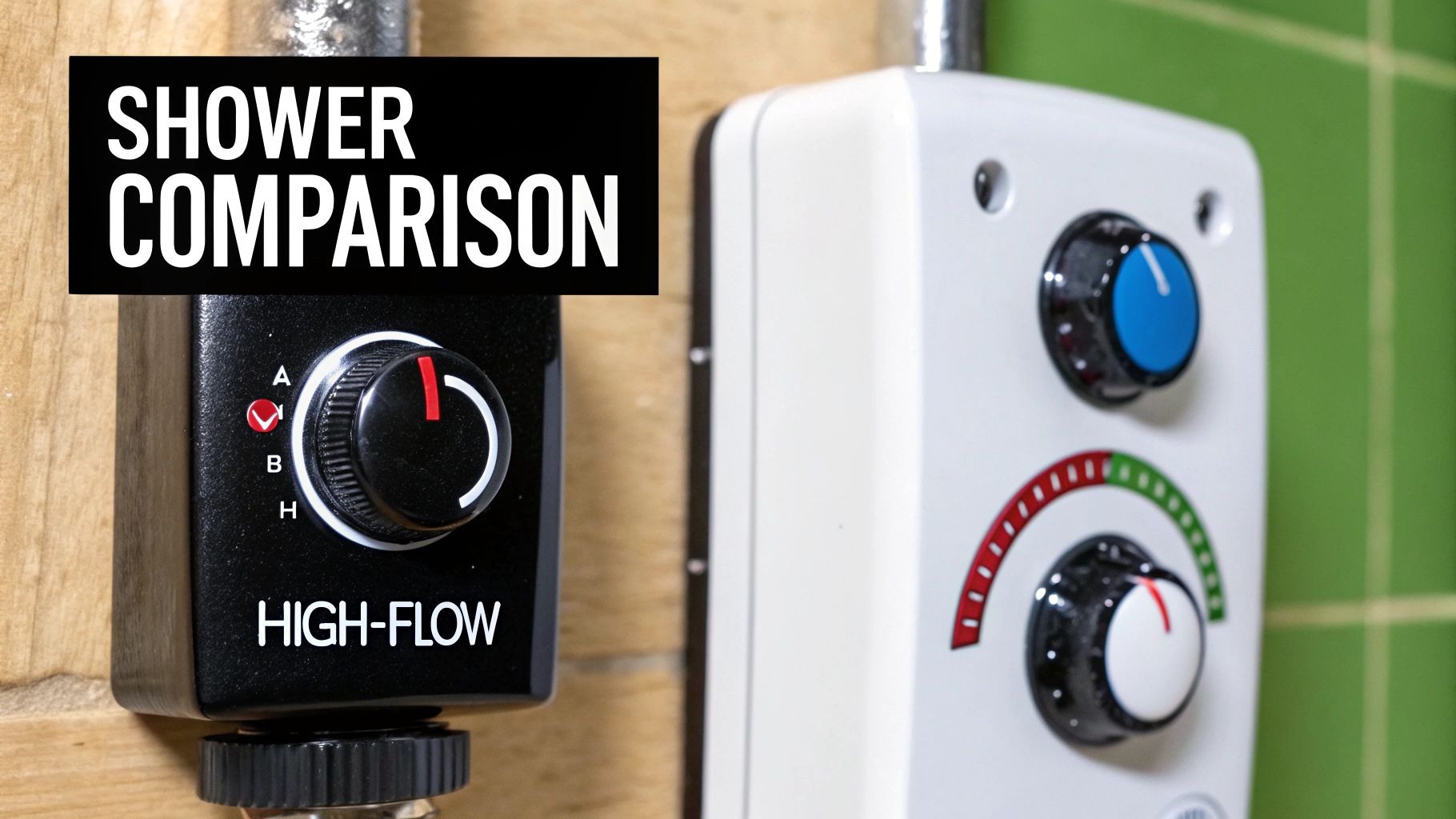Difference Between Power Shower and Electric Shower Explained
- Luke Yeates
- Sep 11, 2025
- 12 min read
When you’re thinking about a new shower, it all boils down to one simple question: do you need to heat the water, or do you need more pressure? An electric shower is a self-contained unit that heats cold water on the spot using its own internal element, so it’s completely independent of your boiler. A power shower, on the other hand, takes the hot and cold water you already have and uses a pump to give it a serious pressure boost.
Understanding the Core Difference in Showers
This single distinction is a game-changer for homes across Eastbourne, whether you're in a modern flat with a combi boiler in the Sovereign Harbour or an older Victorian house in Meads with a gravity-fed system. The path you choose will affect everything from the installation complexity and your daily running costs to, most importantly, the kind of shower you get to enjoy every morning. Here at Harrlie Plumbing and Heating, we’ve found that once homeowners grasp this key difference, making the right choice becomes much clearer.
Electric showers are a familiar sight in the UK, found in roughly 25% of households. Their popularity comes from their sheer convenience and efficiency—they only heat the water you need, right when you need it, which cuts down on energy waste. You can discover more insights about the electric shower market and its trends.
This image gives you a quick visual summary of where each shower type shines, covering everything from installation to water pressure.

As you can see, a power shower will give you that high-pressure blast you’re looking for but uses more energy to do it. An electric shower is more efficient but often involves a more complex installation.
Key Operational Distinctions
So, let's break down how these two actually work day-to-day. Getting your head around the mechanics is the best way to figure out which one is a good fit for your home's plumbing. And if you have a modern heating system, it’s also worth checking out our guide on choosing the best shower for a combi boiler.
The core decision often comes down to this: an electric shower creates hot water on demand, whereas a power shower amplifies the pressure of existing hot water. This is the single most important factor we discuss with our Eastbourne clients at Harrlie Plumbing and Heating.
Before we get into the nitty-gritty, this quick table sums up the fundamental differences.
At a Glance: Power Shower vs Electric Shower
Feature | Electric Shower | Power Shower |
|---|---|---|
Water Source | Takes only a cold water mains feed. | Mixes existing hot and cold water supplies. |
Primary Function | To heat water instantly. | To boost water pressure and flow. |
Boiler Dependency | Independent of the boiler. | Dependent on the boiler for hot water. |
Key Component | Internal heating element. | Integrated pump. |
This table lays out the basics, but now let’s explore what these differences mean for your home, your bills, and your daily routine.
How Each Shower System Actually Works
Let's get under the bonnet and see what really powers your daily shower. The fundamental difference between a power shower and an electric one is all about how they heat and pressurise the water, and that's what makes them suitable for completely different types of homes. Getting your head around these mechanics is the key to picking the right one.

The Electric Shower: An Instant Heater
The easiest way to think of an electric shower is like a super-powerful, on-demand kettle mounted to your bathroom wall. It’s a simple setup, connecting to just one pipe—your cold water mains.
When you turn it on, that cold water flows across an internal heating element, which instantly zaps it up to your chosen temperature before it comes out of the showerhead. This clever, self-contained process means it's completely independent of your boiler. Boiler on the blink? No problem, you can still have a hot shower.
You'll see their power measured in kilowatts (kW), usually between 8.5kW and 10.5kW. A higher kW rating simply means it has a more powerful element that can heat the water faster. This is especially noticeable during Eastbourne's colder months when the mains water is chilly and needs more oomph to get it comfortably hot.
The core function of an electric shower is to create hot water from a cold supply. Its performance is directly tied to its kilowatt rating and the temperature of the incoming mains water.
The Power Shower: A Pressure Booster
A power shower, on the other hand, is all about brute force and flow. It isn't designed to heat water at all. Instead, it connects to both your hot and cold water supplies, which are typically fed from a hot water cylinder and a cold water tank in the loft.
Its one and only job is to fix the common problem of pathetic water pressure. How? With its secret weapon: an integrated pump.
This pump basically acts like a turbocharger for your water. It aggressively mixes the hot and cold water together and blasts it out of the showerhead at a rate a gravity-fed system could only dream of. That’s what gives you that invigorating, high-pressure spray. But remember, because it relies on your boiler's hot water, a power shower is useless if your boiler breaks down.
Here at Harrlie Plumbing and Heating, we find these are often the perfect solution for older Victorian properties in the Old Town area of Eastbourne with traditional gravity-fed plumbing, turning a frustrating dribble into a properly powerful shower.
Comparing Water Pressure and Performance
This is where you’ll feel the real difference between a power shower and an electric one. Day-to-day performance is everything, and the right choice for your Eastbourne home really comes down to the plumbing system you already have.
An electric shower is a wonderfully consistent option for homes that are already blessed with good mains water pressure. Think properties with modern combi boilers—they usually have the pressure needed to make an electric shower feel great. For example, many of the newer builds in areas like Langney Point have excellent pressure, making an electric shower a straightforward choice. But if your home suffers from low pressure, an electric shower's performance can be, well, a bit sad. It can turn what should be a refreshing start to your day into a frustrating trickle.
And that's where a power shower steps in.

The Power Shower Solution for Low Pressure
Power showers were literally designed to fix the low-pressure blues common in gravity-fed systems. If you've got a hot water cylinder and a cold water storage tank (often tucked away in the loft), this is you. For instance, if you live in one of Eastbourne’s charming older properties in the Old Town or Meads, a power shower could be the difference between a weak dribble and a powerful, satisfying spray.
It works its magic by using a built-in pump to actively boost the water pressure from your hot and cold supplies before it hits the shower head.
They’re a popular choice across the UK for this very reason. A power shower typically delivers a much higher flow rate, averaging around 9-12 litres per minute. Compare that to the 6-8 litres per minute you’d get from an average electric shower, and you can see why it feels so much better.
An electric shower guarantees hot water on demand, while a power shower guarantees a high-pressure flow. Your choice depends on which of these two benefits solves your home’s biggest problem.
Identifying Your Home's Needs
Before you make any decisions, you need to understand your home’s water pressure. Low pressure isn't just a minor annoyance; it’s the single biggest factor that dictates which type of shower will actually work well in your bathroom. It’s why our team at Harrlie Plumbing and Heating always carries out a pressure test before recommending any installation in Eastbourne. There’s simply no other way to be sure you’ll get the performance you’re paying for.
If you suspect your pressure is on the low side, look out for a few tell-tale signs. Does the water flow weaken when someone else turns on a tap? Does your current shower struggle to produce much more than a gentle stream?
For homeowners keen to get to the bottom of it, our guide on how to increase water pressure in your UK home has some valuable insights. Ultimately, the performance difference is simple: an electric shower is a heater, but a power shower is a booster.
Installation Requirements and Typical Costs
Getting to grips with the installation process for each shower is vital because it has a direct impact on the overall cost and time involved. The fundamental difference between fitting a power shower versus an electric shower boils down to the specific electrical and plumbing work each one needs. These requirements shape not just the upfront cost, but also how complex the job will be.

Electric Shower Installation
Putting in an electric shower is, first and foremost, an electrical job. It needs its own dedicated, heavy-duty circuit running straight from your consumer unit (or fuse box). This is far from a simple plug-in task; because of the high power it draws, the work falls under Part P of the Building Regulations. This means it absolutely must be handled by a qualified and certified professional.
In many modern Eastbourne homes, especially those built in the last 20 years, the wiring might already be up to the job, which simplifies things. Here at Harrlie Plumbing and Heating, we often find that a straightforward replacement for a client in, say, Willingdon, can be done and dusted in just a few hours.
Power Shower Installation
A power shower installation, on the other hand, is much more of a plumbing-focused task. It needs connecting to both your hot and cold water supplies, which are typically fed from a hot water cylinder and a cold water storage tank. While it does need an electrical connection to run its internal pump, this is far less demanding than the heavy-duty circuit an electric shower requires.
Retrofitting a power shower into a bathroom that wasn’t originally set up for one can be more involved, sometimes requiring new pipework to be run. The complexity really depends on your home’s existing plumbing layout and how easy it is to get to the pipes.
The key takeaway is this: an electric shower installation is an electrician-led job with plumbing support, while a power shower is a plumber-led job with electrical support. Understanding this difference is crucial for budgeting and scheduling the work properly.
To give you a clearer picture of what’s involved, the table below breaks down the main installation differences.
Installation Breakdown Electric vs Power Shower
Installation Step | Electric Shower | Power Shower |
|---|---|---|
Primary Expertise | Qualified Electrician (Part P Certified) | Qualified Plumber |
Electrical Needs | Dedicated high-amperage circuit from consumer unit | Standard fused spur for the pump |
Plumbing Needs | Single cold water mains feed | Hot and cold water feeds, usually from a cylinder/tank |
Typical Complexity | High electrical complexity, low plumbing complexity | Low electrical complexity, moderate plumbing complexity |
Ideal System | Any system, as it's self-contained | Gravity-fed systems with a hot water cylinder |
At Harrlie Plumbing and Heating, our qualified engineers in Eastbourne are equipped to handle both the plumbing and electrical coordination. This ensures a safe, seamless installation, whichever shower type you decide is right for your home.
Comparing Running Costs and Energy Use
Once your new shower is installed, the ongoing running costs are where you'll really notice the difference between a power shower and an electric one. Thinking about how each type uses energy is the key to managing your household bills and making a choice that makes long-term financial sense for your Eastbourne home.
An electric shower almost always comes out on top for energy efficiency. It works a bit like a kettle, heating only the water you need, right when you need it. This on-demand approach avoids the standby heat loss you get from keeping a large tank of water constantly hot, making it a savvy choice for smaller households or guest bathrooms that aren't used every day.
On the other hand, a power shower’s running costs are typically higher. It creates a 'double energy draw' – using electricity to drive its internal pump while also pulling hot water that your boiler has already used gas or oil to heat up. This dual consumption simply makes it less efficient for every minute it’s running.
Analysing the Energy Efficiency
The UK shower market has seen a real shift towards energy-conscious models. Between 2018 and 2024, the lower-power <8KW models made up a huge chunk of electric shower sales, showing a clear trend of consumers wanting to keep bills down. This reflects a growing desire to manage rising energy costs without having to put up with a weak shower. You can read the full research about these market trends and their drivers.
This trend makes perfect sense when you look at how an electric shower heats water directly. There's virtually no energy wasted storing hot water, which is a massive plus for anyone looking to shrink their carbon footprint and their utility bills.
While an electric shower costs less per minute to run, a power shower's higher water consumption means you might spend less time in the shower, partially offsetting the cost difference.
A Practical Eastbourne Example
At Harrlie Plumbing and Heating, we often walk our Eastbourne clients through this exact trade-off. Let's picture a family of four in a Roselands home, with everyone showering daily.
Electric Shower: The cost per shower is lower, but the total time spent in the bathroom might creep up, especially if the flow rate is on the gentler side.
Power Shower: You'll pay more per minute because of the pump and pre-heated water, but that invigorating, high-pressure flow often means people get in and out much faster.
Ultimately, the best choice boils down to your priorities. If cutting every possible penny from your utility bills is the main goal, an electric shower is the undeniable winner. But if you're all about that high-performance experience and don't mind slightly higher running costs to get it, a power shower delivers pressure that's hard to beat. It's this kind of nuanced thinking that helps homeowners strike the right balance between performance and long-term financial sense.
Which Shower Is Right for Your Home?
Deciding between a power shower and an electric shower really comes down to what you’re trying to achieve. It’s all about matching the right tech to your home's existing plumbing and what you value most. Once you understand the core difference, the choice becomes much simpler.
Are you trying to solve a low-pressure problem, or do you need a reliable source of hot water? Let’s break it down with some practical, real-world scenarios.
Choose an Electric Shower If…
An electric shower is the perfect solution in a few very common situations. This should be your go-to option if:
You have a combi boiler. Most homes with a combi boiler already have decent mains pressure. An electric shower works brilliantly alongside this system, giving you an efficient and dependable wash.
You want a backup hot water source. Because it heats water on its own, you’ll never be left shivering if your boiler decides to play up. It’s a fantastic bit of plumbing peace of mind.
You're converting a space. For loft conversions or new ensuites in Eastbourne, running a single cold water pipe is far easier and cheaper than extending both hot and cold pipework from your existing system.
Choose a Power Shower If…
A power shower isn’t really about saving money—it’s all about performance. This is the one for you when your main goal is to seriously upgrade your showering experience. Opt for a power shower if:
Your number one goal is fixing low pressure. This is the main reason people install them. If you’re living with a gravity-fed system, a power shower will completely transform a sad trickle into a powerful, invigorating flow.
You prioritise a high-flow experience. If a strong, drenching spray is more important to you than keeping running costs to a minimum, a power shower delivers a level of performance an electric shower simply can’t compete with.
You have a conventional boiler. These systems, which use a separate hot water storage tank, are the ideal match for a power shower. They can easily supply the pre-mixed hot and cold water the shower’s internal pump needs to work its magic.
It's crucial to remember that power showers and combi boilers are not a good mix. To understand why, check out our complete guide on using power showers with combi boilers.
The only way to be absolutely certain is to get a professional in. The Harrlie Plumbing and Heating team can pop round, test your water pressure, and take a look at your home’s system to give you a clear, definitive recommendation tailored specifically for your Eastbourne property.
Your Questions Answered
When you’re weighing up your options, a few questions always seem to pop up. Here are the answers to some of the most common queries we get from homeowners here in Eastbourne, hopefully clearing up any confusion between power and electric showers.
Can I Replace My Electric Shower With a Power Shower?
Yes, absolutely. This is an upgrade we handle all the time at Harrlie Plumbing and Heating, but it’s not quite a straight swap. An electric shower gets by with just a cold water supply, heating the water itself. A power shower, on the other hand, needs both a hot and cold feed to do its job.
This means a qualified plumber will need to run a new hot water pipe from your cylinder to where the shower will be. Our team can pop over to your Eastbourne home, take a look at the layout, and give you a clear plan for the new pipework involved.
Do Power Showers Work With Combi Boilers?
This is a big one: generally, no. Power showers are purpose-built to boost the low pressure you typically get from a gravity-fed system—the kind with a hot water cylinder and a cold water tank, usually in the loft. Combi boilers are a different beast altogether, as they already deliver high-pressure hot water on demand, straight from the mains.
Trying to pair a power shower with a combi boiler is a bit like putting a turbocharger on an engine that’s already turbocharged. The pump becomes redundant and is often incompatible, which can cause performance headaches or even damage the pump or your boiler.
What Maintenance Do These Showers Need?
Both types of showers are pretty low-maintenance, but they do appreciate a bit of regular cleaning. The main thing to watch out for is limescale buildup in the showerhead, which is a common nuisance in our local hard water area here in Eastbourne. Giving it a good soak in a descaling solution every few months will keep the water flowing just right.
Beyond that, both are very reliable. You’ll typically only need to call in a professional if a fault develops. If you ever notice the performance dropping off or hear a strange noise, our Harrlie Plumbing and Heating engineers can quickly get to the bottom of it and sort out any repairs, ensuring your shower runs perfectly again.
Still weighing your options or need a professional eye to assess your bathroom in Eastbourne? Get in touch with Harrlie Plumbing and Heating today. We’re happy to offer expert advice and a free, no-obligation quote at https://www.harrlieplumbing.co.uk.

Comments